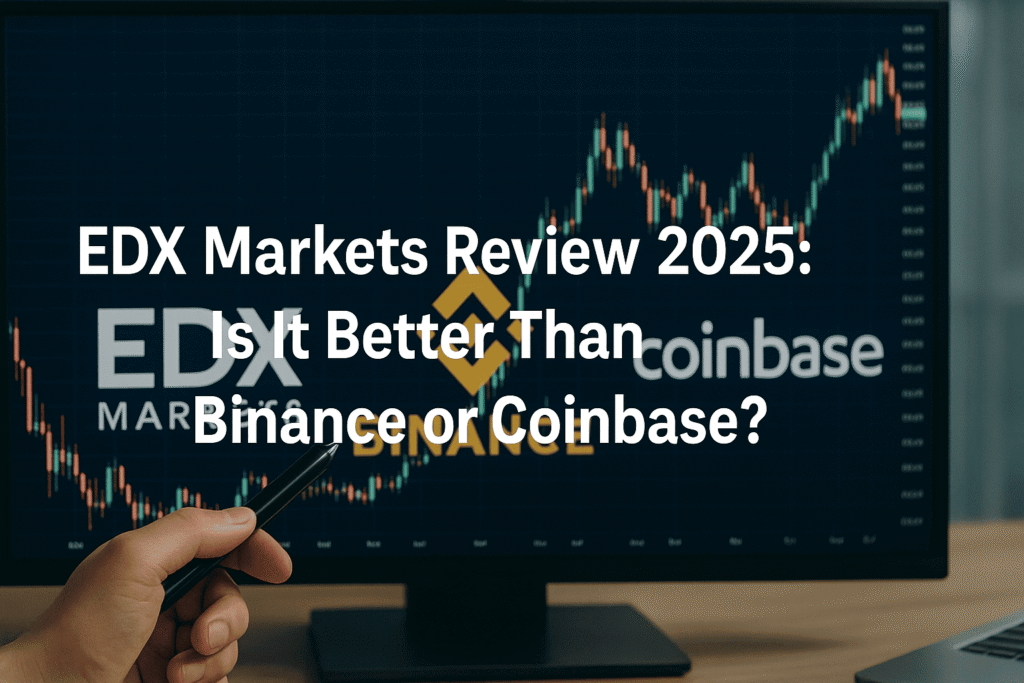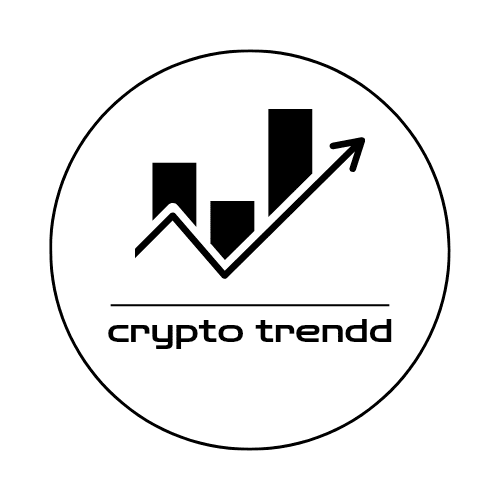EDX Markets Review 2025: Is It Better Than Binance or Coinbase?

Introduction – EDX Markets Review 2025
If you’ve been around the crypto scene, you’ve probably heard the buzz about EDX Markets. It’s not your everyday exchange. Launched with the backing of Wall Street powerhouses, EDX is built with one specific audience in mind: institutions. But as crypto evolves in 2025, the big question remains — can EDX outperform retail titans like Binance and Coinbase? Let’s dive into this head-to-head review.
What Makes EDX Markets Different?
Built for Institutions, Not Retail
EDX isn’t trying to be your go-to app for buying $10 worth of DOGE. Instead, it’s laser-focused on serving big players — hedge funds, banks, and asset managers. That alone sets it apart from Binance or Coinbase, which are optimized for everyday users and traders.
No Crypto Custody — A Key Difference
Unlike traditional exchanges, EDX doesn’t hold your crypto. That’s right — no wallets, no hot or cold storage, no fear of the platform being hacked and your assets disappearing.
Non-Custodial Model Explained Simply
Think of EDX like a crypto NASDAQ. It matches buyers and sellers, but the actual assets are stored and settled off-platform via trusted third-party custodians. This model removes a lot of the regulatory headaches.
Official Website – EDX Markets
Founding Backers and Credibility

Backed by Wall Street Giants
EDX isn’t some startup from nowhere. It was founded with backing from Charles Schwab, Fidelity Digital Assets, Citadel Securities, and Sequoia Capital. That level of support screams credibility.
Traditional Finance Meets Crypto
EDX is the clearest example of TradFi (traditional finance) finally crossing into crypto on their own terms. If Coinbase and Binance were built by crypto-native teams, EDX is the suit-and-tie version.
👉 eToro vs Binance vs BitGlide: Best Crypto App for Daily Trading in 2025
EDX’s Trading Model vs Binance and Coinbase

Centralized Exchange vs Custody-Free Order Book
Binance and Coinbase are classic centralized exchanges (CEXs) — you sign up, deposit funds, and trade on their order books. EDX flips that model.
How Trading Works on EDX Markets
You trade through member brokers or institutions who interact with EDX’s order-matching engine. Once the trade is confirmed, a third-party custodian handles the actual asset settlement.
Role of Custodians and Clearing Firms
This two-layer system — EDX for matching, custodians for clearing — gives institutions peace of mind. It’s more like how stock trading works.
Supported Cryptocurrencies in 2025

What Coins Can You Trade?
As of mid-2025, EDX supports Bitcoin (BTC), Ethereum (ETH), Litecoin (LTC), and Bitcoin Cash (BCH). You won’t find hundreds of tokens here — and that’s intentional.
Regulatory-Compliant Crypto Assets Only
EDX avoids anything remotely sketchy. You won’t see meme coins or controversial altcoins. It’s all about SEC-friendly assets.
👉 10 Best Crypto Trading Apps Compared (2025): Find the Right App for Your Style
Security and Compliance

SEC-Friendly by Design
EDX is built to play nice with regulators. Every step — from how it lists assets to how it settles trades — is designed to avoid the SEC’s wrath.
How EDX Avoids Regulatory Wrath
Simple: they don’t custody crypto, don’t allow retail, and don’t list tokens the SEC might deem securities. Genius, right?
EDX Fee Structure

Lower Fees for Institutions
EDX’s fees are designed to appeal to high-volume traders, offering lower costs than typical retail platforms.
Comparison Table: EDX vs Binance vs Coinbase Fees
| Platform | Maker Fee | Taker Fee | Retail Friendly? |
|---|---|---|---|
| EDX Markets | Negotiable (Institutional) | Negotiable | ❌ |
| Binance | 0.10% | 0.10% | ✅ |
| Coinbase | 0.40% | 0.60% | ✅ |
Liquidity and Market Depth

How EDX Sources Liquidity
Because it’s institution-only, liquidity on EDX comes from large broker-dealers and market makers — not everyday traders.
Comparison to Binance and Coinbase
EDX may not have the same 24/7 firehose of retail orders, but its liquidity is deeper and more stable, perfect for big trades.
User Experience & Interface

Is It Easy to Use for Institutions?
If you’re an institution with a trading desk, EDX feels like home. It’s API-first, custom-tailored, and efficient.
Lack of Retail-Focused Features
No mobile app, no colorful charts, no “Buy Now” buttons. EDX doesn’t bother with that because you’re not supposed to be using it unless you’re an institution.
Who Should Use EDX Markets?
Institutional Traders and Hedge Funds
If you’re a trading firm or hedge fund, EDX offers a more secure, regulatory-friendly, and scalable solution.
Is It Worth It for High Net-Worth Individuals?
Maybe — but only if you qualify as an institution or can access it through one. This isn’t for weekend traders.
Pros and Cons of EDX Markets
Pros
- Fully compliant and SEC-friendly
- No custody risk
- Backed by major financial institutions
- Low fees for large-volume trading
- Ideal for institutions
Cons
- Not available to retail investors
- Limited crypto asset selection
- No mobile app or easy UI
- Can’t hold funds on the platform
EDX vs Binance vs Coinbase: Final Comparison Table
| Feature | EDX Markets | Binance | Coinbase |
|---|---|---|---|
| Custody | No | Yes | Yes |
| Target Audience | Institutions | Everyone | Everyone |
| Fees | Low (institutional) | Low | Medium-High |
| Regulatory Compliance | High | Moderate | High |
| Supported Coins | Few | Hundreds | Dozens |
| Retail Friendly | No | Yes | Yes |
Future Outlook of EDX Markets

Will It Scale to Retail in the Future?
Unlikely. EDX’s whole value prop is being the institutional alternative to retail-heavy exchanges. But maybe they’ll partner with brokers to offer access indirectly.
Market Predictions and Expansion Plans
Expect more custodians, more assets (SEC-approved ones), and possible international expansion into other regulated markets.
Conclusion
So, is EDX Markets better than Binance or Coinbase?
For retail investors? Not even close. But for institutions? Absolutely. If you’re managing millions and want to stay compliant while avoiding custody risk, EDX might just be your dream exchange.
The crypto landscape in 2025 is changing fast — and EDX is leading the charge for the institutional wave.
FAQs
1. What is EDX Markets best known for?
It’s known for being a non-custodial, institutional crypto exchange backed by Wall Street.
2. Can individual retail investors use EDX Markets?
Nope. It’s strictly for institutional clients only.
3. Is EDX Markets safer than Coinbase or Binance?
In terms of regulatory compliance and custody risk? Yes, EDX is considered safer by design.
4. Why do institutions prefer EDX?
Because it removes custodial risk, is SEC-friendly, and offers deep liquidity for large trades.
5. Will EDX launch a native token?
Highly unlikely. That would undermine its regulatory-first approach.
Please don’t forget to leave a review.
